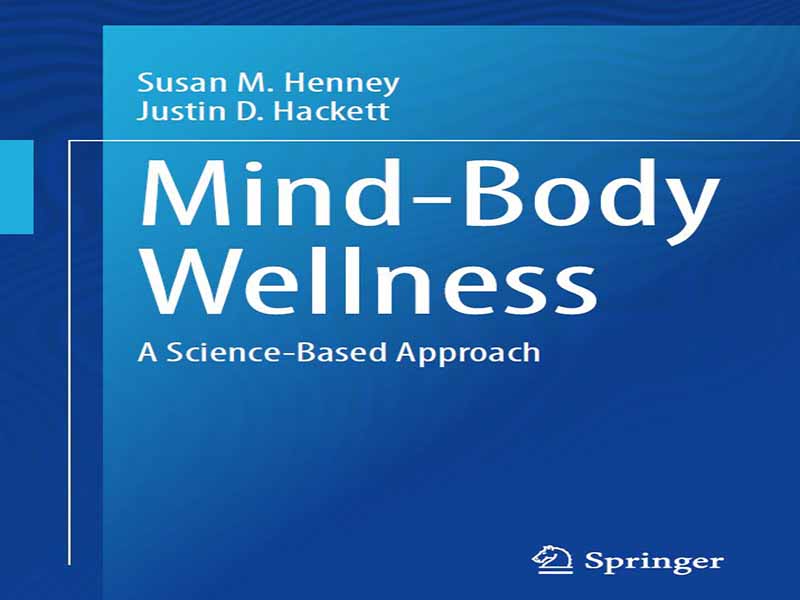- عنوان کتاب: Mind-Body Wellness
- نویسنده: Susan M. Henney, Justin D. Hackett
- حوزه: ذهن
- سال انتشار: 2025
- تعداد صفحه: 264
- زبان اصلی: انگلیسی
- نوع فایل: pdf
- حجم فایل: 4.83 مگابایت
سلامت به طور کلی، و سلامت ذهن و بدن به طور خاص، دیگر در حاشیه دانشگاهها نیست. مدارک و گواهینامههای زیادی با تأکید بر سلامت در دانشگاهها و کالجهای سراسر جهان در حال توسعه هستند. اکنون، بیش از هر زمان دیگری، دانشجویان مشتاقند تا در مورد چگونگی افزایش حس سلامت روان و جسم خود، و همچنین خانواده، دوستان و مراجعین، اطلاعات بیشتری کسب کنند. دورههای دانشگاهی در حوزه سلامت ذهن و جسم معمولاً تعامل پویا بین ذهن و جسم ما را با تمرکز بر رفتارها، تکنیکها و رویکردهایی که بر توسعه و حفظ سلامت و رفاه تأثیر میگذارند، بررسی میکنند. چنین کلاسهایی همچنین به روشهایی میپردازند که فرضیات و باورهای ما در مورد ارتباط ذهن و بدن با نحوه نگرش ما به سلامت و بیماری مرتبط است. این متن مبتنی بر شواهد برای پشتیبانی از یادگیری، خوداندیشی و تغییر رفتار در چنین دورههایی با بررسی چگونگی ارتباط سلامت انسان با ابعاد سلامت ذهن و جسم طراحی شده است. بخش مراقبتهای بهداشتی در حال رشد است و پیشبینی میشود تا سال ۲۰۳۰ بیش از ۲.۵ میلیون شغل دیگر ایجاد شود. با این حال، چهره مراقبتهای بهداشتی در حال تغییر است و طب سنتی معمولاً با رویکردهای سلامت ذهن و بدن تکمیل میشود. این رویکردها بهطور گسترده شامل تغذیه سالم، ارتقای تناسب اندام، تمرینهای ذهنآگاهی، مدیریت استرس، سلامت محیط کار، ارتقای سلامت روان و موارد دیگر میشود. این بخش صنعتی رو به رشد، تریلیونها درآمد ایجاد میکند و دانشجویان در برنامههای مرتبط به آموزشهای علمی مناسب برای ارتقای سلامت در محیطهای مختلف نیاز دارند.
هر چقدر هم که حوزه سلامت در گفتمان معاصر محبوب باشد، بهطور خاص در معرض اطلاعات نادرست، اطلاعات نادرست و شبهعلم قرار دارد. جذابیتهای احساسی، ارائه اطلاعاتی که «به نظر علمی میآیند و میآیند»، سوءظن در مورد انگیزههای مؤسسات پزشکی و دارویی، بازاریابی رسانههای اجتماعی که در پوشش سلامت پنهان شدهاند، و سوگیریهای شناختی نسبت به راهحلهای «طبیعی» و «جایگزین» برای بیماری، همگی دلایلی هستند که چرا مردم میتوانند توسط جنبههای شبهعلمی فرهنگ سلامت فریب بخورند. تبدیل شدن به یک مصرفکننده انتقادیتر اطلاعات میتواند به ما کمک کند تا از پیچیدگیهای نحوه بازاریابی فرهنگ سلامت برای خود عبور کنیم. این کتاب درسی با مروری بر ارتباط ذهن و بدن، رویکردهای تعریف تندرستی و معنای تندرستی برای افراد آغاز میشود. فصلهای بعدی مباحث اساسی مرتبط با آموزش در این زمینه، مانند علم در مقابل شبهعلم، مشکلات روزمره، تندرستی محیطی، تندرستی در روابط، معنویت و برنامهریزی تندرستی را پوشش میدهد. کتاب با بررسی این موضوع که چگونه تندرستی ذهن و بدن نه تنها میتواند بر تندرستی شخصی ما، بلکه بر تندرستی اجتماعی نیز تأثیر بگذارد، به پایان میرسد.
وعده تندرستی ذهن و بدن تضمین شده نیست، حتی زمانی که به طور گسترده بر بهبود آن تمرکز کنیم. همانطور که در این متن متوجه خواهید شد، تمرکز بر سلامت و تندرستی ما بیشتر از آنچه فکر میکنید پیچیده است، و با این حال تمرکز بر بهبود تندرستی میتواند تغییرات مثبتی در زندگی ما ایجاد کند. ذهن و بدن ما به طور پیچیدهای به هم متصل هستند و حمایت از یکی اغلب بر دیگری تأثیر مثبت میگذارد. زندگی در تندرستی یک سفر است – ما موفقیتهایی خواهیم داشت و لحظاتی خواهیم داشت که از اهداف خود عقب میمانیم – با این حال، روند شکوفایی و بالندگی در تمام بخشهای زندگی بسیار ارزشمند است.
Wellness in general, and mind–body wellness in particular, is no longer at the fringes of academia. Many degrees and certificates with a wellness emphasis are being developed at universities and colleges all over the world. Now, more than ever, students yearn to know more about how to increase their own sense of mental and physical wellness, as well as that of family, friends, and clients. Academic courses in mind–body wellness typically explore the dynamic interaction between our minds and physical bodies, with a focus on behaviors, techniques, and approaches that impact the development and maintenance of health and well-being. Such classes also address the ways in which our assumptions and beliefs about the interconnection of mind and body relate to how we view health and illness. This evidence-based text is designed to support learning, self-reflection, and behavior change in such courses by exploring how human well-being is related to dimensions of mind–body wellness.
The healthcare sector is growing, with more than 2.5 million more jobs expected through 2030. However, the face of healthcare is changing, with conventional medicine commonly being supplemented by mind–body wellness approaches. These approaches broadly include healthy eating, fitness promotion, mindfulness practices, stress management, workplace wellness, mental health promotion, and more. This growing industry sector generates trillions in revenues, and students in relevant programs require appropriate science-based training to promote wellness in a variety of settings.
As popular as the field of wellness is in contemporary discourse, it is particularly subject to misinformation, disinformation, and pseudoscience. Emotional appeals, presentation of information that “looks and sounds scientific,” suspicion about the motives of the medical and pharmaceutical establishments, social media marketing disguised as wellness, and cognitive biases toward “natural” and “alternative” solutions to ill health are all reasons why people can be deceived by the pseudoscientific aspects of wellness culture. Becoming a more critical consumer of information can help us wade through the complexities of how wellness culture is marketed to us.
The textbook begins with an overview of the mind–body connection, approaches to defining wellness, and what wellness means to people. Subsequent chapters cover the foundational topics relevant to training in this field, such as science vs pseudoscience, daily hassles, environmental wellness, wellness in relationships, spirituality, and wellness programming. The book ends with consideration of how mind–body wellness can not only impact our personal well-being but also societal well-being.
The promise of mind–body wellness is not guaranteed, even when we focus extensively on improving it. As you will discover through this text, focusing on our health and wellness is more involved than you may think, and yet focusing on improving wellness can bring positive changes to our lives. Our minds and our bodies are intricately connected and supporting one often positively impacts the other. Living in wellness is a journey—we will have successes, and we’ll have moments where we fall short of our goals—yet the process of thriving and flourishing in all parts of life is so worth it.
این کتاب را میتوانید از لینک زیر بصورت رایگان دانلود کنید:
Download: Mind-Body Wellness




































نظرات کاربران